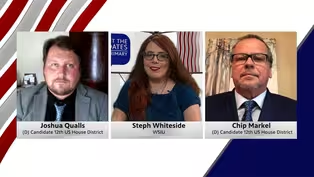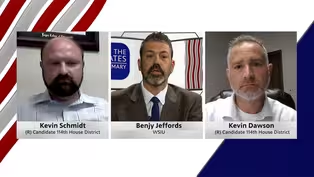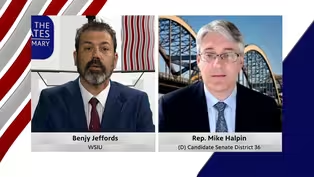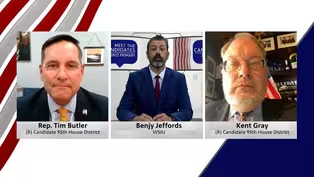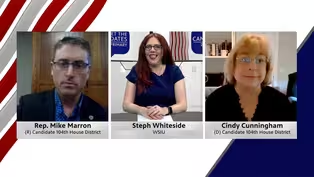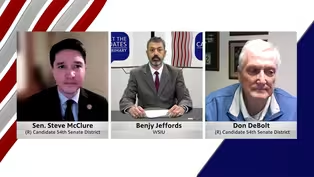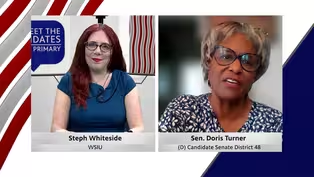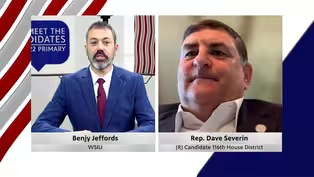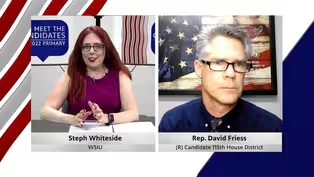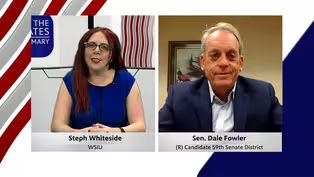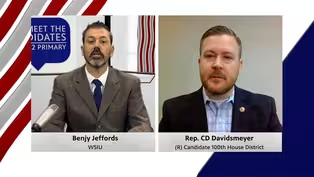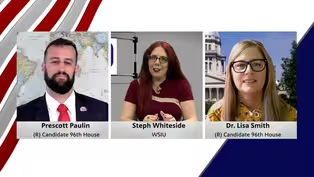Meet the Candidates
71st House District Primary Candidate
6/9/2022 | 21m 35sVideo has Closed Captions
Ahead of the June primary, WSIU talked with Christopher Demink, running for the 71st House
Ahead of the June primary, WSIU talked with Christopher Demink, running for the 71st House District.
Problems playing video? | Closed Captioning Feedback
Problems playing video? | Closed Captioning Feedback
Meet the Candidates is a local public television program presented by WSIU
This series is produced in partnership with the League of Women Voters
Meet the Candidates
71st House District Primary Candidate
6/9/2022 | 21m 35sVideo has Closed Captions
Ahead of the June primary, WSIU talked with Christopher Demink, running for the 71st House District.
Problems playing video? | Closed Captioning Feedback
How to Watch Meet the Candidates
Meet the Candidates is available to stream on pbs.org and the free PBS App, available on iPhone, Apple TV, Android TV, Android smartphones, Amazon Fire TV, Amazon Fire Tablet, Roku, Samsung Smart TV, and Vizio.
Providing Support for PBS.org
Learn Moreabout PBS online sponsorshipMore from This Collection
Meet the Candidates features interviews with candidates running for Illinois state, House and Senate races. Guests will discuss key issues impacting Illinois voters such as the economy, the environment, education and public health. This series is produced in partnership with the League of Women Voters.
12th U.S. Congressional Seat Primary Candidate Forum
Video has Closed Captions
Joshua Qualls and Chip Markel, running for the 12th U.S. Congressional Seat. (25m 21s)
114th Illinois House District Primary Candidate Forum
Video has Closed Captions
Dr. Kevin Schmidt and Kevin Dawson, running for the 114th House District. (25m 57s)
36th Senate District Primary Candidate Forum
Video has Closed Captions
WSIU talked with 36th Senate District candidate Representative Mike Halpin. (26m 29s)
95th Illinois House District Primary Republican Candidates
Video has Closed Captions
Representative Tim Butler and Kent Gray, running for the 95th House District. (26m 58s)
104th Illinois House District Primary Candidates
Video has Closed Captions
104th House District candidates Representative (R) Mike Marron and (D) Cindy Cunningham. (26m 49s)
54th Illinois Senate District Primary Republican Candidates
Video has Closed Captions
54th Illinois Senate District Primary Republican Candidates forum. (25m)
48th Illinois Senate District Primary Democrat Candidates
Video has Closed Captions
48th Illinois Senate District Primary Democrat Candidates forum. (26m 46s)
116th Illinois House District Primary Republican Candidates
Video has Closed Captions
116th Illinois House District Primary Republican Candidates forum. (25m 9s)
115th Illinois House District Primary Republican Candidates
Video has Closed Captions
115th Illinois House District Primary Republican Candidates forum. (23m 14s)
59th Illinois Senate District Primary Republican Candidate
Video has Closed Captions
WSIU interviews Senator Dale Fowler from the 59th Senate District. (27m 29s)
100th Illinois House District Primary Republican Candidates
Video has Closed Captions
WSIU interviews candidate C.D. Davidsmeyer, running for the 100th House seat. (26m 9s)
96th Illinois House District Primary Republican Candidates
Video has Closed Captions
Candidates Prescott Paulin and Dr. Lisa Smith, running for the 96th House seat. (28m 45s)
Providing Support for PBS.org
Learn Moreabout PBS online sponsorship(upbeat music) (camera shutter clicks) (soft soothing music) - This is 'Meet The Candidates' on WSIU.
We're here with Democrat Christopher Demink, who's running for Illinois's 71st House District.
I'm Jennifer Fuller, sitting in for Steph Whiteside.
WSIU public broadcasting, and the league of women voters are pleased to host today's forum.
Chris, thanks so much for joining us.
- Oh, my pleasure.
- We should point out, we did reach out to the two Republicans also running in this race, Matthew Rauschert and Dan Swanson.
They're seeking their party's nomination in the 71st District.
They declined to participate in this forum.
So Chris, let's get started.
What's your number one priority if elected?
And I know it can be hard to narrow it down, but let's please try to stick to just one.
- Jobs, good paying jobs.
- Tell me more about jobs.
What would you do to create more, to keep the ones that are already in place, and to make sure that people can earn a decent living?
- Incentives.
And I know it's a dirty word for some people, but unionize.
You know, I'm retired IBW Local 145.
I've never seen a union hurt any business.
In fact because it controls the market, it helps the business.
- Okay.
What would make you in particular, an effective lawmaker if you're elected?
- I've been around.
I don't like people that screw around and don't do their job.
We've had a couple of the past, people who've gone in there, (coughs) and they don't vote for the people, and what they're doing.
They're voting straight party.
And I don't mean to scare anybody off of the Democrats, but I don't plan to vote completely, I plan to vote for what the people need.
Okay?
There's a couple votes like Dan Swanson's had that have actually been against the area and against money coming into our area, and I don't agree with that.
You should vote for the people, not what the party tells you to vote for.
- Okay.
- All right.
- The COVID pandemic has exposed disparities in education funding.
What would you do to make sure that schools in your district are able to meet the needs of both families and students?
- Well, proper alignment with salaries, and, you know, what it costs to actually run a school.
Every place varies.
From schoolyard to schoolyard it varies, and it costs different.
We need a adjustment, use the money right.
And, you know, have a closer look at where it's going.
And adjust for fire there, and make sure it's being used properly.
- Okay.
The state budget is always a major priority in Springfield.
Can you tell us three things that you would prioritize for funding, and what three things would you cut?
- Well, right now, communication.
I think Mendoza's been doing an excellent job of doing the budgeting.
So I can't really disparage her at all.
We're heading in the right direction I truly believe.
If we increased better paying jobs, like I've said in the past in meetings, people didn't come to Illinois for the weather.
They came here because they had good paying jobs.
We need to keep that, and increase that, keep that going.
And give incentives for doing so.
But I didn't mean to tick off from what you're asking, but that's what I kinda went into.
- Sure.
When it comes though to budget cuts, are there areas that you can see that places need to be cut or scaled back?
- Well, right now, I'll be honest with you cause I'm an outsider.
I truly don't have access to the information to tell you a lot of the nay or yay of that.
You know, I can only poke and hope, and guess what needs to be done as far as that goes.
- [Jennifer] Sure.
- So, that's just, that's life.
That's part of being an outsider.
- All right.
As the economy begins to recover in the early stages, after we're trying to come out of pandemic, inflation is also on the rise.
What do you think you could do to help Illinoisans who are finding that their paychecks just don't stretch as far as they did even a few months ago?
- Well, we just have to wait the course out right now.
A lot of the inflation problems are caused by other things other than the Illinois itself.
I hate to be that way, but sometimes you just gotta see what happens down the road and tackle each problem as it comes along and just take it as it comes.
Try to fix it.
- Okay.
Many people are pushing for more renewable energy, particularly with the rising price of oil.
But at the same time, lots of parts, several parts of Illinois have fossil fuel supplies that could provide energy for many years to come.
What would you do to ensure that Illinois has a steady supply of energy, and the ability to keep it affordable for Illinoisans?
- Well, two things.
I was part of a coal gasification plant in Southern Indiana.
And that's one thing you could do with coal.
You don't have to burn it as it is.
It can be turned into other sources.
And the other thing is, there's other styles of reactors out there, such as what they call molten salt or thorium reactors, that have a smaller footprint, run greener and even safer than the present reactors, that they just need to be invested in.
So that's what I would do, is change coal into a different form, you know use it in other ways that would be cleaner.
And that way we wouldn't lose the coal industry either.
We'd just convert it to something else.
And also take a different look at nuclear.
Whether it be thorium or fission, you know.
Just do different power plants.
See right now Illinois has, if you know it, we have a lot of nuclear power plants.
We feed a lot of, you know, people.
And with the electrical I should say, and we need to increase that.
It'd be nice if we could be exporting more electricity than what we're doing right now.
- Okay.
COVID-19 again, really changed the way that people look at healthcare, and in particular public health.
What would you do to make sure Illinois is prepared to handle future public health emergencies?
- Well, if one thing worked was Medicare, and you know, make it more affordable for people.
We've gotta, the health industry's gone nuts, and everybody knows this.
And it's not, it's purely because of greed on the part of the providers.
You can say what you want.
And I know some got good intentions but, we need to dig into getting rid of some of that flagrant abuse of the system.
So people can afford to go to a hospital when they need to, and get proper healthcare when they need to, and be more preventative too.
That's another way to go, is to be more on the preventative side.
- Okay.
Gun violence continues to be a problem for communities across the state.
What would you do to address the violence, and how do you balance that with Second Amendment rights?
- Well, it's simple.
What they need to do is enforce the laws they got.
We've got tons of laws on the books that tells you what we should or shouldn't do.
You look at all those recent shootings, even all over the country.
And many, many, many of the time, if not most, if not all, have been illegal.
They shouldn't be able to get the guns.
The one recently in the Buffalo, he shouldn't have been able to get the gun.
They should be enforcing the laws they got.
Let's start doing that, before we start making more laws.
Let's make the ones we got stick, and make 'em work.
To use 'em properly instead of, walking away from or turn our backs on people, start doing our job and enforcing stuff.
- In a similar topic, criminal justice reform has become quite a hot topic in Springfield as well.
Do you support changes to the system including alternative sentencing options, things like drug courts, and what changes would you make to ensure safety while also making sure rehabilitation remains an option?
- Well, the same thing they've been going at right now.
They need to, the non-victimless crimes need to be treated like non-victimless crimes.
We're paying a lot of money for people to be in prison, the highest in the world.
And it's just, it's amazing.
But part of that could be alleviated just by if somebody's not murdering somebody in a process of their addiction.
Well, treat it as such.
You don't put 'em in jail for ten years for- The laws need to be leaned towards, away from recidivism (scoffs).
If I'm using the term right.
You know what I'm saying?
People don't want to- You shouldn't be putting people back in.
You should be keeping 'em out, keeping 'em working.
That's how I look at it.
- Sure.
Recent events have shown how much Americans can be impacted by global politics.
It's evidenced in the supply chain shortages and rising prices due to the pandemic and fighting in Ukraine.
What do you think you can do to help minimize those disruptions of events like these on the people of Illinois?
- Well, for one thing, the diesel fuel.
We could have more soybeans used for diesel fuel, for the people out of our, for the farmers in our community, stuff like that.
And that wouldn't hurt either.
Reduce the price that way.
Just make it more incentivized to have more people in the industry.
Pay 'em better, treat 'em better, you know?
Get 'em a good job.
They're gonna drive truck, make sure they're happy.
- [Jennifer] Sure.
- They're gonna run a train, make sure it's safe.
You know, there's laws right now, the Burlington Northern and places like that.
We're trying to get down to where they only have one person on a train.
Can imagine 200 cars moving down a track, one person in charge of the whole thing.
If anything happens, anything at all, to that person or that train that has to be distracted from that operator, we're messed up, and it's happened already.
And presently in the news it's been happening.
But we gotta keep it safe and keep it moving.
That's what we gotta do.
- Okay.
What would you do to make sure the concerns of your constituents are heard in Springfield?
Particularly considering population density, skews toward the Northern and Eastern part of the state?
- Well, for one thing, you need to get out and talk to the people.
Find out what they want, what they wish, what they need.
Be more active as far as having to do with, you know as far as going around and talking to constituents.
The North and the East thing has more to do with federal than it is local.
You gotta remember that most of the money spent at the local levels by the school board and stuff like that.
That has nothing to do with Chicago.
You can still make it better for your own constituents by listening to them and making their, give the money they need from Springfield.
As I like to say, the last time, we need our fair share coming back from Springfield.
So, let's just make that happen, and then work with the local governments to make sure it's put where it needs to go.
That's how I'd start it.
- When it comes to fair and free elections, what would you do to ensure those fair elections and access to voting is available for all people in Illinois?
- Well, I think right now Illinois's doing pretty good.
I didn't really hear of anything happening wrong, any problems we've been having at all.
I haven't heard of darn thing.
Be it if you, unless you know something I don't.
That's just a made up, that's called 'The Big Lie,' and that's why it's called 'The Big Lie.'
'Cause you know, they just want to use an excuse to get their own way.
And so, but presently I think Illinois's doing just fine.
- Okay.
When it comes to internet access, it's becoming increasingly necessary for people to work and go to school.
What will you do to make sure that rural areas can access the high speed internet that they so desperately need?
- Increase the hubs, bring 'em down to the level where like the local library has not just the inside computers, but maybe have a a WiFi system that somebody in a certain area could access.
That would help.
And it's already someplace handy that we could use.
And just fill in the holes with the, you know, proper transmission and WiFi lines.
Expand it.
That's all you can do.
Expand it, find out where the holes are, you know.
Make it better.
- Sure.
Outside of the healthcare industry, one of the things that COVID-19 has impacted the most in Illinois is the state's unemployment fund.
It depleted a lot of that fund.
How would you address that?
- Well, that's a matching fund with the employers too.
So that should build up eventually with the lower amount of unemployment we got right now.
I think in the long run it'll actually take care of itself.
So it may be something that you could banter about right now.
But if you watch the budget, watch your P's and Q's, it'll come back eventually here pretty soon.
- Okay.
Illinois has some of the highest property taxes in the country.
What would you do to provide relief for homeowners?
- Spread out the cost.
There's certain areas that have a lot higher taxes, and some areas that have hardly any.
(laughs) In my area, especially.
But that's all you can do.
Spread out the cost a little more and reduce it.
Do other ways.
Reduce the- Sometimes there's a large amount of local government that could be decreased or eliminated, and put back on the tax rolls.
Money could be put back on the tax rolls.
So that's something to look at into too.
You've got, oh, like in our townships here, you've got three or four townships right within a few miles of each other, and they're all doing the same thing.
Well, why do we need four road commissioners to do the same thing?
One takes care of ninety miles, when you could have one taking care of 300 miles.
And I know, but I'm saying consolidate, is the term I'm thinking about.
So consolidate it is.
- Okay.
Social services are another area that funding has been depleted during the pandemic.
What would you do to make sure Illinoisans get the help that they need from those social service agencies?
- Well, I'm not familiar with that at all.
I'll be honest with you.
I think.
Hmm.
That's a, sorry to be that way at the moment here.
Well, just looks- (scoffs) Well, I would think that would be something you could deal with on the general budget.
And maybe reduce pay to the politicians, and put some back towards the social services.
- Okay.
Okay.
Meanwhile, Illinois has had a long problem with leaders involved in ethics violations, sometimes to the level of criminal prosecution.
What's your position on ethics reform?
- There should be all the ethics reform you need, because power corrupts.
Ultimate power, ultimately it corrupts.
So that's what's happening there.
These people get in, they're like ticks and they just need, they need to have other ways get rid of them.
Everybody talks term limits until they get in.
That would alleviate it, but that's what I'm saying.
Everybody talks like that.
I'm remembering Chuck Braley, what was it?
Iowa was talking about term limits 'til he got in.
(laughs) A lot of of politicians talk about 'em.
That'd be a one way to do it.
'Cause that way wouldn't be able to- Fact is like, if you are in the military and you're in general, you get transferred around so you don't have a following, a constituency like that.
Maybe something like that could be kept in mind.
And like I said, term limits again.
- Okay.
Illinois also has a bit of an image of not being business friendly in the past.
What would you do to help the state attract new businesses while maintaining the ones that are already here?
- Well, just keep going the way Pritzker's going.
He's doing okay.
He's done better than some in the past.
So, oh, all you can do is give 'em incentives, incentives that pay off in the long run.
Maybe a tapering incentive, that doesn't eliminate at all, or all at one time.
But in the long run, it's gonna be something good for everybody.
That's what I'm saying.
But you gotta have- Illinois has a good-trained workforce, and that's another thing that can attract people.
So, we need to work with incentives, incentives, incentives.
That's all I can think about for that matter.
- Okay.
Just a few minutes remaining.
I wonder if you'd like to take some time to tell people a little bit about your own background and what's unique about the 71st district, that makes you want to represent them?
- I like the people.
I was born and raised in this area.
I was, like I said, retired IBW.
Eight years near reserves.
I like this area, and I like the people.
They're great people.
I can't see living anywhere else in the country.
You know, one thing about being in the union, I've had to travel a few times for jobs, and I haven't seen anybody, any place that's got anybody better than this area.
I really appreciate it.
It's hard to explain, but you know sometimes the grass isn't always greener on the other side, sometimes it isn't.
I wanna be elected purely to help the people, and make sure they get what they need from the government.
And that's pretty much all there is to it, you know, if you could do that.
- Do you see challenges in balancing rural versus urban needs, or is that something that you think that you can negotiate fairly well?
- You know, born and raised in urban.
So it's just, they're gonna go hand in hand with each other.
That's all.
They just gotta work together.
They have to work together, because socially that's what they do, is they need each other.
So, they're just gonna have to get along.
All there is to it.
- All right.
Well, that begins to wrap things up.
I want to thank you for joining us, on this 'Meet the Candidates' for the Illinois House District 71.
This is Democrat Christopher Demink.
You can tune in next Thursday as we continue our series, leading up to the June 28th primary.
You can find all of our 'Meet the Candidates' interviews at our website WSIU.org, and by liking and subscribing to our WSIU TV YouTube channel.
For WSIU, I'm Jennifer Fuller.
(soothing upbeat music)

- News and Public Affairs

Top journalists deliver compelling original analysis of the hour's headlines.

- News and Public Affairs

FRONTLINE is investigative journalism that questions, explains and changes our world.












Support for PBS provided by:
Meet the Candidates is a local public television program presented by WSIU
This series is produced in partnership with the League of Women Voters

